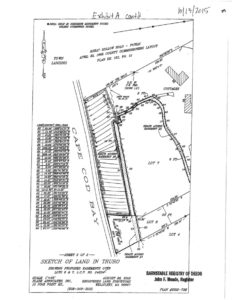TRURO — At a forum organized by the Truro Part-Time Resident Advisory Committee on Aug. 19, several part-time residents advocated building more affordable housing in town, with some saying the lack of housing had caused a shortage of health-care providers that made it difficult for them to imagine living in Truro full-time.
The session had been organized as a way for residents to speak with each other and current town officials about their concerns and priorities for the town.
The forum was the first one to be produced by the town’s recently reconstituted advisory committee, whose six members were appointed by the select board in March after a previous iteration of the committee disbanded in 2018.
“What we’re aiming for here is really as wide a range of viewpoints as possible,” said advisory committee co-chair and part-time resident Stephen Duncombe at the outset of the forum.
Town Moderator Paul Wisotzky served as facilitator, and select board members Susan Girard-Irwin and Nancy Medoff and chair Sue Areson were in attendance.
Linda Brady, a part-timer, physician, and member of the advisory committee, said that, speaking for herself, the difficulty in accessing health care here is a major reason she is not a full-time resident.
Phineas Baxandall, a co-chair of the committee, said that his experience was that when his mother became ill he realized that “the Outer Cape was not a place where a home health worker could live or raise a family.”
Baxandall said the long commute for home health-care workers to reach Truro was “an enormous problem. It really felt like not the way I would want this community to be,” he said, adding that this was his opinion.
Sarah Hill, a 20-year part-timer, lauded the town’s efforts toward building new housing, “both at the Cloverleaf and the Walsh property.”
Hill argued that building housing on the 70-acre Walsh property could reduce the region’s traffic rather than increase it.
“Workers who currently have to drive to Wellfleet, Truro, and P’town from Harwich or Dennis or even farther away will have an option of living closer to their work,” Hill said, adding that that would “bring massive benefits to the town and to the Cape more broadly.”
Route 6 can become intensely congested in summer, and the prospect of increased traffic entering the highway from Walsh Way is often raised as a downside of building new housing there.
Deborah Peterson, a California resident who said she rents her Truro house on a weekly basis in the summer, commended the town’s “Truro Talks” newsletter for offering a steady stream of information.
She and several other speakers said they wished for a stronger voice in town affairs.
“I would have wanted to vote for the affordable housing,” said Peterson, who is not registered to vote here.
Clint Kershaw, a former part-time resident who now lives in Truro year-round, said that he believed part-time residents should be able to serve on the town’s regulatory boards, which include the planning board, zoning board of appeals, board of health, and conservation commission.
He suggested that part-time residents could demonstrate their collective commitment to the town by applying to fill vacancies on nonregulatory boards.
“You would show that you’re involved in town, and you want to become involved,” Kershaw said. That could lead to the right to serve on regulatory boards, he said.
Ann D’Ercole, who had applied to serve on the advisory committee but withdrew her application because the select board did not want to appoint both her and her partner, asked about the two empty houses that the town had relocated to South Highland Road.
“I’d like to know what the real situation is” with those homes, D’Ercole said, mentioning the possibility of asbestos and other factors that might have delayed the use of the houses by town employees.
David Leviatin, who lives in London, asked how the town’s advisory committee was communicating with the Truro Part-Time Resident Taxpayers’ Association (TPRTA), a group formed in 1996 to be “an independent voice year-round for part-time resident taxpayers in Truro.”
The TPRTA’s meetings are open only to its members.
“I think it would be best for them to answer that, but we are in communication with them, and they’ve shown up at our meetings,” said Duncombe.
Participants also asked how often the part-time resident advisory committee would interact with the select board.
Part-timers are an especially large proportion of property owners in Truro, with 71 percent of the town’s housing stock used seasonally, according to the Cape Cod Commission.
Larry Pisapio, who chaired all six meetings of the 2018 version of the advisory committee, said that his group had encountered difficulty getting the select board’s ear back then. “We never had a chance, although we requested to meet with them,” Pisapio said.
“I’m an elected official, but I represent all taxpayers in Truro,” said Areson, the select board chair. “If this group wants to come before the select board four times a year, we’re all ears,” she added.
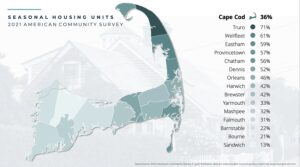
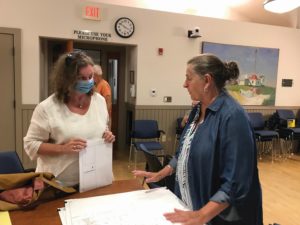


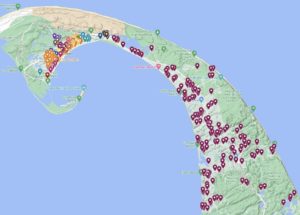
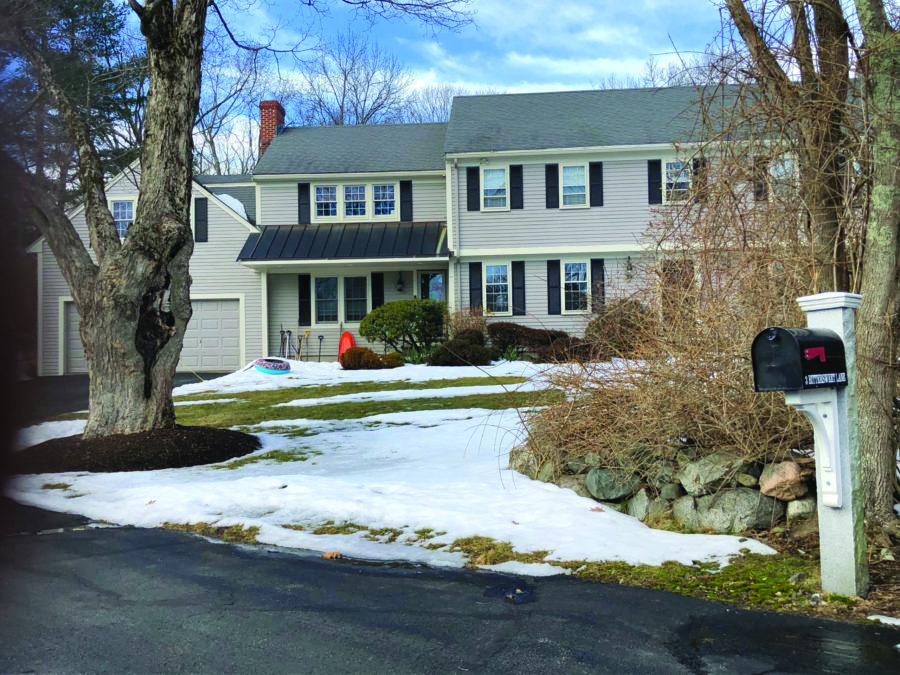

 When questioned by photographer Nancy Bloom, this calf at the Mooney Farm on South Pamet Road denied posting “Keep Truro Rural” stickers around town. (Photo Nancy Bloom)
When questioned by photographer Nancy Bloom, this calf at the Mooney Farm on South Pamet Road denied posting “Keep Truro Rural” stickers around town. (Photo Nancy Bloom)
